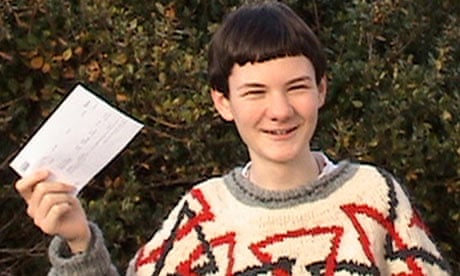andor.oxinst.com/learning/view/article/measuring-resistance-of-a-superconducting-sample-with-a-dry-cryostat Not a video, but well done, by Oxford Instruments.
It is exactly what you'd expect from the name, Waring was watching Netflix with Goldbach, when they suddenly came up with this.
en.wikipedia.org/wiki/Ruth_Lawrence
When Lawrence was five, her father gave up his job so that he could educate her at home.
www.dailymail.co.uk/femail/article-3713768/Haunting-lesson-today-s-TV-child-geniuses-Ruth-Lawrence-Britain-s-famous-prodigy-tracked-father-drove-heard-troubling-tale.html
he had tried it once before - with an older daughter, Sarah, one of three children he had by a previous marriage.That experiment ended after he separated from Sarah's increasingly concerned mother, Jutta. He soon found a woman more in tune with his radical ideas in his next spouse, Sylvia Greybourne
In this case, the problem becomes equivalent to reversing modular exponentiation.
This computational problem forms the basis for Diffie-Hellman key exchange, because modular exponentiation can be efficiently computed, but no known way exists to efficiently compute the reverse function.
Of course, because what we know about the halting problem, there cannot exist a single decider that decides all Turing machines.
E.g. The Busy Beaver Challenge has a set of deciders clearly published, which decide a large part of BB(5). Their proposed deciders are listed at: discuss.bbchallenge.org/c/deciders/5 and actually applied ones at: bbchallenge.org.
But there are deciders that can decide large classes of turing machines.
Many (all/most?) deciders are based on simulation of machines with arbitrary cutoff hyperparameters, e.g. the cutoff space/time of a Turing machine cycler decider.
The simplest and most obvious example is the Turing machine cycler decider
Solving the Schrodinger equation with the time-independent Schrödinger equation by  Ciro Santilli 40 Updated 2025-07-16
Ciro Santilli 40 Updated 2025-07-16
Before reading any further, you must understand heat equation solution with Fourier series, which uses separation of variables.
Once that example is clear, we see that the exact same separation of variables can be done to the Schrödinger equation. If we name the constant of the separation of variables for energy, we get:
- a time-only part that does not depend on space and does not depend on the Hamiltonian at all. The solution for this part is therefore always the same exponentials for any problem, and this part is therefore "boring":
- a space-only part that does not depend on time, bud does depend on the Hamiltonian:Since this is the only non-trivial part, unlike the time part which is trivial, this spacial part is just called "the time-independent Schrodinger equation".Note that the here is not the same as the in the time-dependent Schrodinger equation of course, as that psi is the result of the multiplication of the time and space parts. This is a bit of imprecise terminology, but hey, physics.
Because the time part of the equation is always the same and always trivial to solve, all we have to do to actually solve the Schrodinger equation is to solve the time independent one, and then we can construct the full solution trivially.
Once we've solved the time-independent part for each possible , we can construct a solution exactly as we did in heat equation solution with Fourier series: we make a weighted sum over all possible to match the initial condition, which is analogous to the Fourier series in the case of the heat equation to reach a final full solution:
- if there are only discretely many possible values of , each possible energy . we proceed and this is a solution by selecting such that at time we match the initial condition:A finite spectrum shows up in many incredibly important cases:Equation 3.Solution of the Schrodinger equation in terms of the time-independent and time dependent parts.
- if there are infinitely many values of E, we do something analogous but with an integral instead of a sum. This is called the continuous spectrum. One notable
The fact that this approximation of the initial condition is always possible from is mathematically proven by some version of the spectral theorem based on the fact that The Schrodinger equation Hamiltonian has to be Hermitian and therefore behaves nicely.
It is interesting to note that solving the time-independent Schrodinger equation can also be seen exactly as an eigenvalue equation where:The only difference from usual matrix eigenvectors is that we are now dealing with an infinite dimensional vector space.
- the Hamiltonian is a linear operator
- the value of the energy
Eis an eigenvalue
Furthermore:
- we immediately see from the equation that the time-independent solutions are states of deterministic energy because the energy is an eigenvalue of the Hamiltonian operator
- by looking at Equation 3. "Solution of the Schrodinger equation in terms of the time-independent and time dependent parts", it is obvious that if we take an energy measurement, the probability of each result never changes with time, because it is only multiplied by a constant
Article likely written by him: www.theguardian.com/commentisfree/2010/feb/22/home-schooling-register-families
“Especially my father. He was doing most of it and he is a savoury, strong character. He has strong beliefs about the world and in himself, and he was helping me a lot, even when I was at university as an undergraduate.”An only child, Arran was born in 1995 in Glasgow, where his parents were studying at the time. His father has Spanish lineage, having a great grandfather who was a sailor who moved from Spain to St Vincent in the Carribean. A son later left the islands for the UK where he married an English woman. Arran’s mother is Norwegian.
One of the articles says his father has a PhD. TODO where did he work? What's his PhD on? Photo: www.topfoto.co.uk/asset/1357880/
www.thetimes.co.uk/article/the-everyday-genius-pxsq5c50kt9:
Unlisted articles are being shown, click here to show only listed articles.


